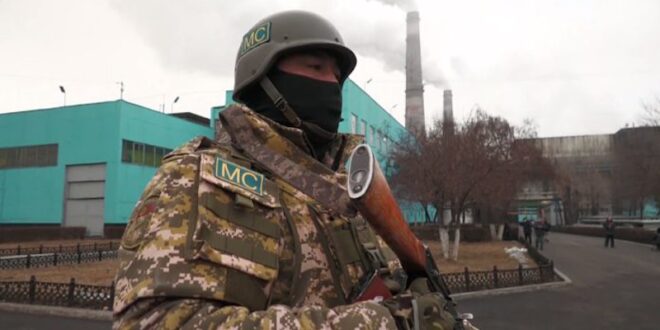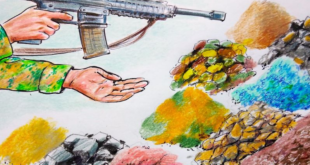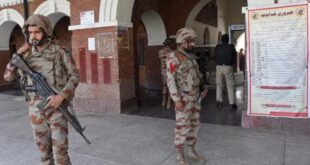The Russian-led military operation in Kazakhstan has presented an important test for Moscow’s ties with Beijing.
In early January, Kazakhstan was shaken by nationwide protests that sparked uncertainty in the central Asian nation that had hitherto remained largely stable. Though much remains to be seen as to how the events exactly transpired, Russia’s reaction to the unrest was quite direct and clear. In short order, Moscow activated the long-dormant Collective Security Treaty Organization (CSTO) to aid its allies in the Tokayev government.
The dispatch of some 2500 Russian, Armenian, Tajik, Belarussian, and Kyrgyz troops into Kazakhstan produced a lively debate. The discussion was led by questions on how China might react to upheaval in its neighboring country and, crucially, Russia’s leadership role in the response.
Many onlookers have long argued that such a development in Central Asia could easily spark tensions and wider divisions between the two powers. Yet, thus far, the potential for disruption in bilateral relations appears to have been greatly overstated.
China’s Reaction
Firstly, it is important to stress that Kazakhstan is a critically important country for China.
Beijing’s sprawling Belt and Road Initiative actively operates in Kazakhstan and the country serves as one of the key routes for China to reach Europe, either through Russia or the Caspian Sea and the South Caucasus. Beijing has also heavily invested into the country ($19.2 billion in 2005-2020) and developed relatively stable bilateral ties with Nur-Sultan. The stability is no small feat in light of occasional difficulties surrounding such sensitive issues as the detention of ethnic Kazakhs in China’s westernmost Xinjiang region.
Both countries are also bound together by the Shanghai Cooperation Organization (SCO), a multilateral grouping founded in 2001 to facilitate security and economic cooperation in the heart of Eurasia. Moreover, both also are part of emerging closely linked groups of fellow authoritarian states bent on supporting each other lest liberal ideals undermine their one-party governance model.
Beijing’s reaction to the unrest in Kazakhstan was neither opposing nor endorsing Russia’s military move. However, in an unusually strong statement of support for Kazakhstan’s leader Kassym-Jomart Tokayev, Xi Jinping supported the framing that the upheaval in Kazakhstan was an attempt to carry out a color revolution and needed to be quashed.
China also made an official statement through the Shanghai Cooperation Organization that the entity is “willing to play a positive role in stabilizing the situation” in Kazakhstan. Wang Wenbin, a spokesman for China’s Foreign Ministry also added that “safeguarding member states’ and regional stability has always been the principle and mission of the Shanghai Cooperation Organization.”
Sino-Russian Condominium
Though relatively muted, China’s reaction to Kazakhstan reveals much about China-Russia relations in Central Asia. It has long been suggested that both players have had an unofficial division of labor in the region. Russia has been primarily preoccupied with security issues – military bases, drills, exchange of sensitive intelligence information. China, in contrast, has been active in the economic sphere through growing investment, increasing control of Tajikistan’s and Kyrgyzstan’s debt shares and generally blossoming trade ties across the region.
Lately, however, the unofficial arrangement seemed to be coming under pressure as China continues to make significant inroads into the security area. It opened a military base in Tajikistan and in late 2021 even announced funding a new semi-military complex to be manned by the Tajik personnel. The number and depth of military drills held by China and Central Asian states also increased.
The CSTO activation by Moscow and its allies, however, could signal the reversal of this emerging process with Russia firmly re-establishing its position as a sole security provider in Central Asia.
This does not however mean that China is eager to get embroiled in the Kazakhstan events. On the contrary, a careful reading of official Chinese statements shows Beijing is happy with Russia undertaking a security operation there.
The CSTO activation by Moscow and the successful completion of the operation also shows that the argument of China and Russia imminently heading toward a collision is inherently wrong. Both have grievances and perhaps deep concerns that in the longer run might resurface more concretely, but the two also learned to de-conflict.
Russia is confident that what China does is not undermining Moscow’s basic interests. Surely, Chinese economic presence hurts its Russian competitors, but the alternative to allowing Chinese presence would be to antagonize Beijing. That is not an attractive scenario for Moscow which seeks Beijing’s support in the age of increased competition with the West.
A similar approach prevails in China. It increases its security presence in Central Asia, but is also careful to explain to Russia that its moves are not intended against Moscow’s position. Beijing has also spent a great deal of time to assure Russia that the Chinese military base in Tajikistan is solely to confront potential threats to Xinjiang whether from Central Asia or from Afghanistan.
The subtlety of the China-Russia partnership lies in the fact that each acknowledges the other’s sphere of influence. Their cooperation as great powers, therefore, rests upon mutual respect.
Still, there are much deeper incentives propping up mutual understanding and serving as a major motivator to tone down differences. Opposition or even an outright enmity (at least in Moscow) to the US-led world system serves as a powerful glue for two Eurasian powers.
Central Asia as a Testing Ground
Ultimately, China and Russia also look at Central Asia as a testing ground for the construction of a post-liberal world order.
Both seek orders of exclusion in their immediate neighborhood, wherein Central Asia is obviously included. Ideally for Russia, a dominant position in the region could be exploited as it indeed was in under Romanov and Soviet rule.
However, cognizant of its diminished power, Moscow understands that exclusively managing the region would be impossible. Countering every move by other large powers would also be impractical and likely unfeasible in the context of today’s highly interconnected world. Hence, Russia has come to the realization that instead of trying to keep China at bay, it would be more efficient to actually build a condominium-style leadership over Central Asia.
A critical element to this new order is the exclusion of the collective West as best exemplified by Washington’s failure to attain Central Asian states’ agreement to renew its military presence in the region following the withdrawal from Afghanistan in 2021.
The emerging Central Asian order is similar to what Russia is trying to build elsewhere. In the Caspian Sea, Moscow now increasingly relies on Iran; in the South Caucasus Moscow on both Iran and Turkey, introducing a system where the presence of non-regional powers is limited if not altogether removed. Similarly, China pursues a closed order in the South China sea.
Thus, China has remained content in general with how the turmoil in Kazakhstan was contained. Discontent between Moscow and Beijing exists, but since the motivation for cooperation is even greater, China and Russia seem poised to successfully manage their great power ties.
 Eurasia Press & News
Eurasia Press & News




